How to Do Transitions for Text in Powerpoint
Animate or make words appear one line at a time
PowerPoint for Microsoft 365 PowerPoint for the web PowerPoint 2021 PowerPoint 2021 for Mac PowerPoint 2019 PowerPoint 2019 for Mac PowerPoint 2016 PowerPoint 2016 for Mac PowerPoint 2013 PowerPoint 2010 PowerPoint for Mac 2011 More...Less
An animation effect option called By Paragraph lets you make list items appear one at a time. This type of animation is sometimes called a build slide.
Make text appear one line at a time
-
On the slide, select the box that contains your text.
-
Select the Animations tab, and then pick an animation, such as Appear, Fade In, or Fly In.

For some animations, such as Fly In, select Effects Options, as you'll need to pick a direction for the bullets to fly in from, such as bottom, top, left, or right.
-
Select Effect Options, and then select By Paragraph to make the paragraphs of text appear one at a time. (The other option, All at Once, makes all the lines of text appear at the same time.)
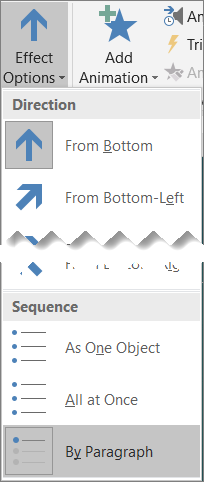
PowerPoint immediately previews the animation for you.
By default, when you present in Slide Show, each paragraph appears in response to a click. That way, you control when each paragraph appears. You can modify this setting by using the Start, Duration, and Delay controls on the far right end of the Animation tab of the ribbon.
Make text appear one letter at a time
You can also create a "typing" visual effect by making characters in a paragraph appear one at a time.
-
On the slide, select the box that contains your text.
-
Select the Animations tab, and then select the Add Animation drop-down menu to select an animation, such as Appear.

-
Select the Animations tab, and then select Animation pane.

The Animation Pane opens on the right side of the PowerPoint window.
-
In the Animation Pane, select the arrow next to your animation, and select Effect Options.
-
In the dialog box, on the Effect tab under Enhancements, select the arrow next to Animate text, and select By letter. Then you can change the delay time in the seconds delay between letters box.
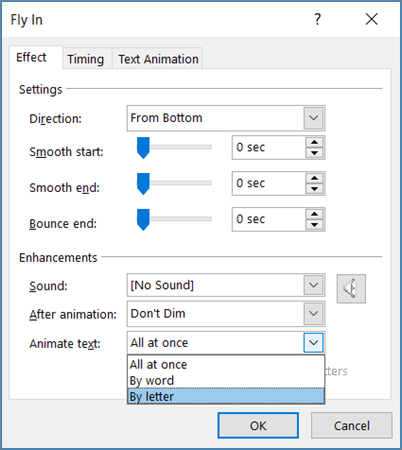
PowerPoint immediately previews the animation for you so that you can see the timing as the characters appear individually. You can repeat the preview by selecting the animation in the Animation Pane and selecting Play Selected.
See Also
Create a build slide
Change, remove or turn off animation effects
Make text appear one line at a time
-
On the slide, select the box that contains your text.
-
Select the Animations tab, and then pick an animation, such as Appear, Dissolve in, or Fly In.

For some animations, such as Fly In, select Effects Options on the Animation tab to pick a direction for the bullets to fly in from, such as bottom, top, left, or right.
-
Select Effect Options again, and then select By Paragraph to make the paragraphs of text appear one at a time. (The other option, All at Once, animates all lines of text in a placeholder or text box at the same time.)
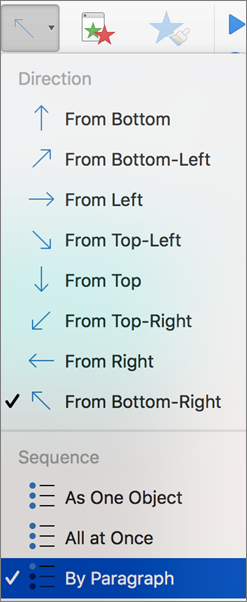
PowerPoint immediately previews the animation for you.
By default, when you present in Slide Show, each paragraph appears in response to a click. That way, you control when each paragraph appears. You may also modify this setting by using the Start, Duration, and Delay options in theAnimation pane.
Make text appear one letter at a time
You can also create a "typing" visual effect by making characters in a paragraph appear one at a time.
-
On the slide, select the box that contains your text.
-
On the Animations tab, select the Add Animation drop-down menu, and select an animation, such as Appear, Fade In, or Fly In.

-
Select the Animations tab, and then select Animation Pane.
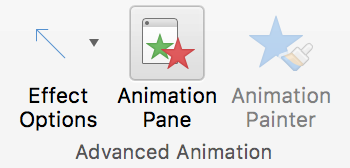
(In PowerPoint for Mac 2011: On the View menu, select Custom Animation).
The Animation Pane opens on the right side of the PowerPoint window.
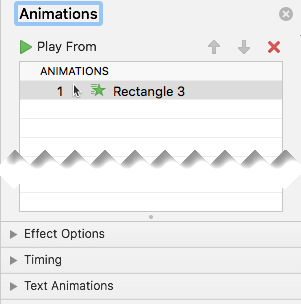
-
In the Animation Pane, select the animation effect you want to modify, and then select the arrow next to Text Animations.
-
In the Animate text box, select By letter.
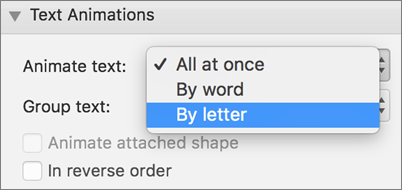
The default delay value for the time between letters appearing is 0.5 seconds, but you can change that by selecting the arrow next to Timing, and then choosing a new value in the Delay box.
PowerPoint immediately previews the animation for you so that you can see the timing as the characters appear individually. You can repeat the preview by selecting the animation in the Animation Pane and selecting Play Selected.
Animate text in a shape
Now let's add Fly in and Spin animations to the text.
-
Select the shape text and select the Animations tab.
-
Select Fly in in Entrance Effects.

-
Select the text again and select Spin in Emphasis Effects. The Animations property pane now looks like this:
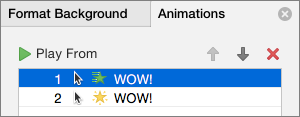
-
(Optional) In the Animations property pane, select each animation step and adjust the Effects options and Timing settings as required. Learn more.
-
To preview the animation, select the first animation and select Play From.
See Also
Animate a word on a slide
Change or remove animation effects
Make text appear one line at a time
-
On the slide, select the box that contains your text.
-
Select the Animations tab, and then pick an animation, such as Appear, Fade In, or Fly In.

For some animations, such as Fly In, select Effects Options, as you'll need to pick a direction for the bullets to fly in from, such as bottom, top, left, or right.
-
Select Effect Options, and then select By Paragraph to make the paragraphs of text appear one at a time. (The other option, All at Once, makes all the lines of text appear at the same time.)

-
To preview the animation, on the View tab of the ribbon, in the Start Slide Show group, select From Current Slide, and then select to see each paragraph of text appear one at a time.

By default, when you present in Slide Show, each paragraph appears in response to a click. That way, you control when each paragraph appears.
See Also
Animate a picture on your slide
Animation effects available in PowerPoint for the web
Need more help?
How to Do Transitions for Text in Powerpoint
Source: https://support.microsoft.com/en-us/office/animate-or-make-words-appear-one-line-at-a-time-cfb5ebdc-90cf-4324-8933-874c7c840175
0 Response to "How to Do Transitions for Text in Powerpoint"
Post a Comment